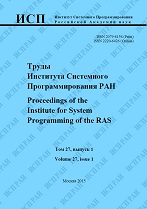|
This article is cited in 1 scientific paper (total in 1 paper)
Promising compilation to ARMv8.3
A. V. Podkopaevab, O. Lahavc, V. Vafeiadisd
a JetBrains Research
b St. Petersburg University
c Tel-Aviv University
d Max Planck Institute for Software Systems
Abstract:
Concurrent programs have behaviors, which cannot be explained by interleaving execution of their threads on a single processing unit due to optimizations, which are performed by modern compilers and CPUs. How to correctly and completely define a semantics of a programming language, which accounts for the behaviors, is an open research problem. There is an auspicious attempt to solve the problem - promising memory model. To show that the model might be used as a part of an industrial language standard, it is necessary to prove correctness of compilation from the model to memory models of target processor architectures. In this paper, we present a proof of compilation correctness from a subset of promising memory model to an axiomatic ARMv8.3 memory model. The subset contains relaxed memory accesses and release and acquire fences. The proof is based on a novel approach of an execution graph traversal.
Keywords:
concurrency, compilation correctness, weak memory models.
Citation:
A. V. Podkopaev, O. Lahav, V. Vafeiadis, “Promising compilation to ARMv8.3”, Proceedings of ISP RAS, 29:5 (2017), 149–164
Linking options:
https://www.mathnet.ru/eng/tisp263 https://www.mathnet.ru/eng/tisp/v29/i5/p149
|

| Statistics & downloads: |
| Abstract page: | 179 | | Full-text PDF : | 55 | | References: | 29 |
|




 Contact us:
Contact us: Terms of Use
Terms of Use
 Registration to the website
Registration to the website Logotypes
Logotypes









 Citation in format
Citation in format 